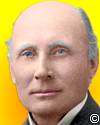 (source)
(source)
|
Alfred North Whitehead
(15 Feb 1861 - 30 Dec 1947)
English mathematician and philosopher who worked in logic, physics, and later in his life spent more time on the philosophy of science and metaphysics. He worked with Bertrand Russell on Principia Mathematica which shows that logic underlies all mathematics.
|
Alfred North Whitehead Quotes on Science (37 quotes)
>> Click for 135 Science Quotes by Alfred North Whitehead
>> Click for Alfred North Whitehead Quotes on | Application | Civilization | Discovery | Education | Error | Fact | Idea | Imagination | Importance | Invention | Knowledge | Learning | Life | Literature | Logic | Mathematics | Mind | Particular | Philosophy | Progress | Thought | Truth |
>> Click for 135 Science Quotes by Alfred North Whitehead
>> Click for Alfred North Whitehead Quotes on | Application | Civilization | Discovery | Education | Error | Fact | Idea | Imagination | Importance | Invention | Knowledge | Learning | Life | Literature | Logic | Mathematics | Mind | Particular | Philosophy | Progress | Thought | Truth |
[In his generation] the worst that happened to men of science was that Galileo suffered an honorable detention and a mild reproof, before dying peacefully in his bed.
— Alfred North Whitehead
In 'The Origins of Modern Science', Science and the Modern World (1926, 2011), 2.
A science which hesitates to forget its founders is lost.
— Alfred North Whitehead
Address to the British Association, Newcastle. 'The Organisation of Thought,' printed in Nature (28 Sep 1916), 98, 80. Also collected in The Aims of Education: & Other Essays (1917), 162.
All science as it grows toward perfection becomes mathematical in its ideas.
— Alfred North Whitehead
In An Introduction to Mathematics (1911), 14. This is part of a longer quote that begins, “In modern times the belief that the ultimate explanation…”, on the Alfred North Whitehead Quotes page of this website.
Archimedes, who combined a genius for mathematics with a physical insight, must rank with Newton, who lived nearly two thousand years later, as one of the founders of mathematical physics. … The day (when having discovered his famous principle of hydrostatics he ran through the streets shouting Eureka! Eureka!) ought to be celebrated as the birthday of mathematical physics; the science came of age when Newton sat in his orchard.
— Alfred North Whitehead
In An Introduction to Mathematics (1911), 37.
Aristotle discovered all the half-truths which were necessary to the creation of science.
— Alfred North Whitehead
From Dialogue XLII in Alfred North Whitehead and Lucien Price (ed.), Dialogues of Alfred North Whitehead (1954, 1977), 344.
Definition of Mathematics.—It has now become apparent that the traditional field of mathematics in the province of discrete and continuous number can only be separated from the general abstract theory of classes and relations by a wavering and indeterminate line. Of course a discussion as to the mere application of a word easily degenerates into the most fruitless logomachy. It is open to any one to use any word in any sense. But on the assumption that “mathematics” is to denote a science well marked out by its subject matter and its methods from other topics of thought, and that at least it is to include all topics habitually assigned to it, there is now no option but to employ “mathematics” in the general sense of the “science concerned with the logical deduction of consequences from the general premisses of all reasoning.”
— Alfred North Whitehead
In article 'Mathematics', Encyclopedia Britannica (1911, 11th ed.), Vol. 17, 880. In the 2006 DVD edition of the encyclopedia, the definition of mathematics is given as “The science of structure, order, and relation that has evolved from elemental practices of counting, measuring, and describing the shapes of objects.” [Premiss is a variant form of “premise”. —Webmaster]
Giordano Bruno was the martyr; though the cause for which he suffered was not that of science, but that of free imaginative speculation. His death in the year 1600 ushered in the first century of modern science in the strict sense of the term.
— Alfred North Whitehead
In 'The Origins of Modern Science', Science and the Modern World (1926, 2011), 1.
In modern times the belief that the ultimate explanation of all things was to be found in Newtonian mechanics was an adumbration of the truth that all science, as it grows towards perfection, becomes mathematical in its ideas.
— Alfred North Whitehead
In An Introduction to Mathematics (1911), 13-14. [To suggest, disclose, or outline partially, produces an “adumbration”, which gives only the main facts and not the details. —Webmaster]
In the first place, there can be no living science unless there is a widespread instinctive conviction in the existence of an Order of Things, and, in particular, of an Order of Nature.
— Alfred North Whitehead
In Science and the Modern World (1927), 4.
Inventive genius requires pleasurable mental activity as a condition for its vigorous exercise. “Necessity is the mother of invention” is a silly proverb. “Necessity is the mother of futile dodges” is much closer to the truth. The basis of growth of modern invention is science, and science is almost wholly the outgrowth of pleasurable intellectual curiosity.
— Alfred North Whitehead
In 'Technical Education and Its Relation to Science and Literature', The Aims of Education and Other Essays (1917), 69.
It is rigid dogma that destroys truth; and, please notice, my emphasis is not on the dogma, but on the rigidity. When men say of any question, “This is all there is to be known or said of the subject; investigation ends here,” that is death. It may be that the mischief comes not from the thinker but for the use made of his thinking by late-comers. Aristotle, for example, gave us our scientific technique … yet his logical propositions, his instruction in sound reasoning which was bequeathed to Europe, are valid only within the limited framework of formal logic, and, as used in Europe, they stultified the minds of whole generations of mediaeval Schoolmen. Aristotle invented science, but destroyed philosophy.
— Alfred North Whitehead
Dialogues of Alfred North Whitehead, as recorded by Lucien Price (1954, 2001), 165.
It is the business of the future to be dangerous; and it is among the merits of science that it equips the future for its duties.
— Alfred North Whitehead
Science and the Modern World: Lowell Lectures, 1925 (1925), 291.
MATHEMATICS … the general term for the various applications of mathematical thought, the traditional field of which is number and quantity. It has been usual to define mathematics as “the science of discrete and continuous magnitude.”
— Alfred North Whitehead
Opening statement in article 'Mathematics', Encyclopedia Britannica (1911, 11th ed.), Vol. 17, 878. Whitehead then indicated this was an inadequate definition, which he then discussed at length and tried to give an improved definition later in the article. See the quote beginning “Definition of Mathematics…” on the Alfred North Whitehead Quotes page on this website.
Mathematics as a science commenced when first someone, probably a Greek, proved propositions about any things or about some things, without specification of definite particular things. These propositions were first enunciated by the Greeks for geometry; and, accordingly, geometry was the great Greek mathematical science.
— Alfred North Whitehead
In An Introduction to Mathematics (1911), 15.
Mathematics is often considered a difficult and mysterious science, because of the numerous symbols which it employs. Of course, nothing is more incomprehensible than a symbolism which we do not understand. … But this is not because they are difficult in themselves. On the contrary they have invariably been introduced to make things easy. … [T]he symbolism is invariably an immense simplification. It … represents an analysis of the ideas of the subject and an almost pictorial representation of their relations to each other.
— Alfred North Whitehead
In Introduction to Mathematics (1911), 59-60.
No man of science wants merely to know. He acquires knowledge to appease his passion for discovery. He does not discover in order to know, he knows in order to discover.
— Alfred North Whitehead
In 'Technical Education and Its Relation to Science and Literature', The Aims of Education: & Other Essays (1917), 74.
No more impressive warning can be given to those who would confine knowledge and research to what is apparently useful, than the reflection that conic sections were studied for eighteen hundred years merely as an abstract science, without regard to any utility other than to satisfy the craving for knowledge on the part of mathematicians, and that then at the end of this long period of abstract study, they were found to be the necessary key with which to attain the knowledge of the most important laws of nature.
— Alfred North Whitehead
In Introduction to Mathematics (1911), 136-137.
Religion will not regain its old power until it can face change in the same spirit as does science. Its principles may be eternal, but the expression of those principles requires continual development.
— Alfred North Whitehead
In 'Religion and Science', The Atlantic (Aug 1925).
Science repudiates philosophy. In other words, it has never cared to justify its truth or explain its meaning.
— Alfred North Whitehead
Lowell Lecture (Feb 1925), 'The Origins of Modern Science', collected in Science and the Modern World (1925), 17.
The aim of science is to seek the simplest explanations of complex facts. We are apt to fall into the error of thinking that the facts are simple because simplicity is the goal of our quest. The guiding motto in the life of every natural philosopher should be, Seek simplicity and distrust it.
— Alfred North Whitehead
In The Concept of Nature: Tarner Lectures Delivered in Trinity College, November 1919 (1920), 163.
The history of Europe is the history of Rome curbing the Hebrew and the Greek, with their various impulses of religion, and of science, and of art, and of quest for material comfort, and of lust of domination, which are all at daggers drawn with each other. The vision of Rome is the vision of the unity of civilisation.
— Alfred North Whitehead
In 'The Place of Classics in Education', The Aims of Education and Other Essays (1929), 79.
The invention of the differential calculus marks a crisis in the history of mathematics. The progress of science is divided between periods characterized by a slow accumulation of ideas and periods, when, owing to the new material for thought thus patiently collected, some genius by the invention of a new method or a new point of view, suddenly transforms the whole subject on to a higher level.
— Alfred North Whitehead
In An Introduction to Mathematics (1911), 217. Whitehead continued by quoting the poet, Percy Shelley, who compared the slow accumulation of thoughts leading to an avalanche following the laying down of a great truth. See the poetic quote beginning, “The sun-awakened avalanche…” on the Percy Shelley Quotations page.
The originality of mathematics consists in the fact that in mathematical science connections between things are exhibited which, apart from the agency of human reason, are extremely unobvious.
— Alfred North Whitehead
In Science and the Modern World (1938), 32.
The progress of Science consists in observing interconnections and in showing with a patient ingenuity that the events of this ever-shifting world are but examples of a few general relations, called laws. To see what is general in what is particular, and what is permanent in what is transitory, is the aim of scientific thought.
— Alfred North Whitehead
In An Introduction to Mathematics (1911), 11.
The really profound changes in human life all have their ultimate origin in knowledge pursued for its own sake. The use of the compass was not introduced into Europe till the end of the twelfth century A.D., more than three thousand years after its first use in China. The importance which the science of electromagnetism has since assumed in every department of human life is due not to the superior practical bias of Europeans, but to the fact that in the West electrical and magnetic phenomena were studied by men who were dominated by abstract theoretic interests.
— Alfred North Whitehead
In Introduction to Mathematics (1911), 32-33.
The results of science are never quite true. By a healthy independence of thought perhaps we sometimes avoid adding other people’s errors to our own.
— Alfred North Whitehead
In 'Space, Time and Relativity', The Aims of Education and Other Essays (1929), 149.
The science [of mathematics] has grown to such vast proportion that probably no living mathematician can claim to have achieved its mastery as a whole.
— Alfred North Whitehead
In An Introduction to Mathematics (1911), 262.
The science of pure mathematics … may claim to be the most original creation of the human spirit.
— Alfred North Whitehead
In Science and the Modern World: Lowell Lectures, 1925 (1925), 29.
The sense for style … is an aesthetic sense, based on admiration for the direct attainment of a foreseen end, simply and without waste. Style in art, style in literature, style in science, style in logic, style in practical execution have fundamentally the same aesthetic qualities, namely, attainment and restraint. The love of a subject in itself and for itself, where it is not the sleepy pleasure of pacing a mental quarter-deck, is the love of style as manifested in that study. Here we are brought back to the position from which we started, the utility of education. Style, in its finest sense, is the last acquirement of the educated mind; it is also the most useful. It pervades the whole being. The administrator with a sense for style hates waste; the engineer with a sense for style economises his material; the artisan with a sense for style prefers good work. Style is the ultimate morality of the mind.
— Alfred North Whitehead
In 'The Aims of Education', The Aims of Education and Other Essays (1929), 23.
The study of mathematics is apt to commence in disappointment. … We are told that by its aid the stars are weighed and the billions of molecules in a drop of water are counted. Yet, like the ghost of Hamlet's father, this greatest science eludes the efforts of our mental weapons to grasp it.
— Alfred North Whitehead
Opening of Chap 1, in An Introduction to Mathematics (1911), 7.
The study of mathematics is apt to commence in disappointment. The important applications of the science, the theoretical interest of its ideas, and the logical rigour of its methods all generate the expectation of a speedy introduction to processes of interest. We are told that by its aid the stars are weighed and the billions of molecules in a drop of water are counted. Yet, like the ghost of Hamlet's father, this great science eludes the efforts of our mental weapons to grasp it.
— Alfred North Whitehead
Opening to An Introduction to Mathematics (1911), 7.
There is only one subject matter for education, and that is Life in all its manifestations. Instead of this single unity, we offer children—Algebra, from which nothing follows; Geometry, from which nothing follows; Science, from which nothing follows; History, from which nothing follows; a Couple of Languages, never mastered; and lastly, most dreary of all, Literature, represented by plays of Shakespeare, with philological notes and short analyses of plot and character to be in substance committed to memory.
— Alfred North Whitehead
In 'The Aims of Education', The Aims of Education: & Other Essays (1917), 10.
To come very near to a true theory, and to grasp its precise application, are two different things, as the history of science teaches us. Everything of importance has been said before by someone who did not discover it.
— Alfred North Whitehead
In The Organisation of Thought (1917), 127. Collected in The Interpretation of Science: Selected Essays (1961), 33.
We forget how strained and paradoxical is the view of nature which modern science imposes on our thoughts.
— Alfred North Whitehead
In Science and the Modern World (1925), 104.
What is peculiar and new to the [19th] century, differentiating it from all its predecessors, is its technology. It was not merely the introduction of some great isolated inventions. It is impossible not to feel that something more than that was involved. … The process of change was slow, unconscious, and unexpected. In the nineteeth century, the process became quick, conscious, and expected. … The whole change has arisen from the new scientific information. Science, conceived not so much in its principles as in its results, is an obvious storehouse of ideas for utilisation. … Also, it is a great mistake to think that the bare scientific idea is the required invention, so that it has only to be picked up and used. An intense period of imaginative design lies between. One element in the new method is just the discovery of how to set about bridging the gap between the scientific ideas, and the ultimate product. It is a process of disciplined attack upon one difficulty after another This discipline of knowledge applies beyond technology to pure science, and beyond science to general scholarship. It represents the change from amateurs to professionals. … But the full self-conscious realisation of the power of professionalism in knowledge in all its departments, and of the way to produce the professionals, and of the importance of knowledge to the advance of technology, and of the methods by which abstract knowledge can be connected with technology, and of the boundless possibilities of technological advance,—the realisation of all these things was first completely attained in the nineteeth century.
— Alfred North Whitehead
In Science and the Modern World (1925, 1997), 96.
When one considers in its length and in its breadth the importance of this question of the education of the nation's young, the broken lives, the defeated hopes, the national failures, which result from the frivolous inertia with which it is treated, it is difficult to restrain within oneself a savage rage. In the conditions of modern life the rule is absolute, the race which does not value trained intelligence is doomed. Not all your heroism, not all your social charm, not all your wit, not all your victories on land or at sea, can move back the finger of fate. To-day we maintain ourselves. To-morrow science will have moved forward yet one more step, and there will be no appeal from the judgment which will then be pronounced on the uneducated.
— Alfred North Whitehead
In 'Organisation of Thought', The Aims of Education: & Other Essays (1917), 22.
Without deductive logic science would be entirely useless. It is merely a barren game to ascend from the particular to the general, unless afterwards we can reverse the process and descend from the general to the particular, ascending and descending like angels on Jacob’s ladder.
— Alfred North Whitehead
In 'Technical Education and Its Relation to Science and Literature', The Aims of Education: & Other Essays (1917), 80.
See also:
- 15 Feb - short biography, births, deaths and events on date of Whitehead's birth.
- Science and the Modern World, by Alfred North Whitehead. - book suggestion.



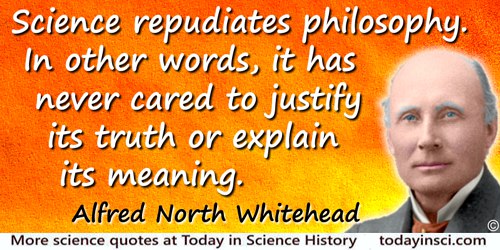
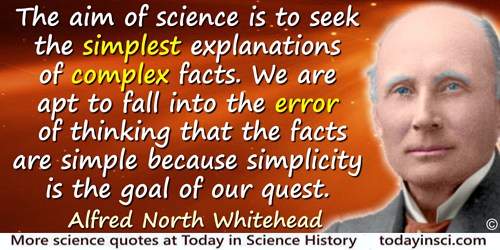
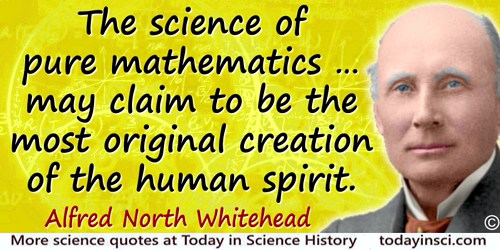



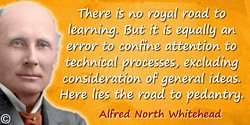
 In science it often happens that scientists say, 'You know that's a really good argument; my position is mistaken,' and then they would actually change their minds and you never hear that old view from them again. They really do it. It doesn't happen as often as it should, because scientists are human and change is sometimes painful. But it happens every day. I cannot recall the last time something like that happened in politics or religion.
(1987) --
In science it often happens that scientists say, 'You know that's a really good argument; my position is mistaken,' and then they would actually change their minds and you never hear that old view from them again. They really do it. It doesn't happen as often as it should, because scientists are human and change is sometimes painful. But it happens every day. I cannot recall the last time something like that happened in politics or religion.
(1987) -- 


